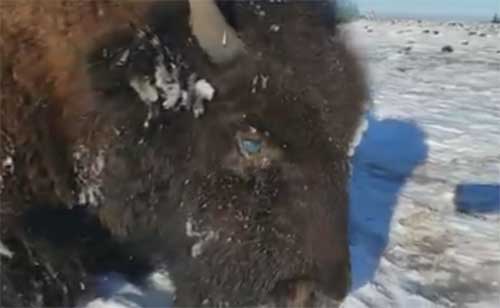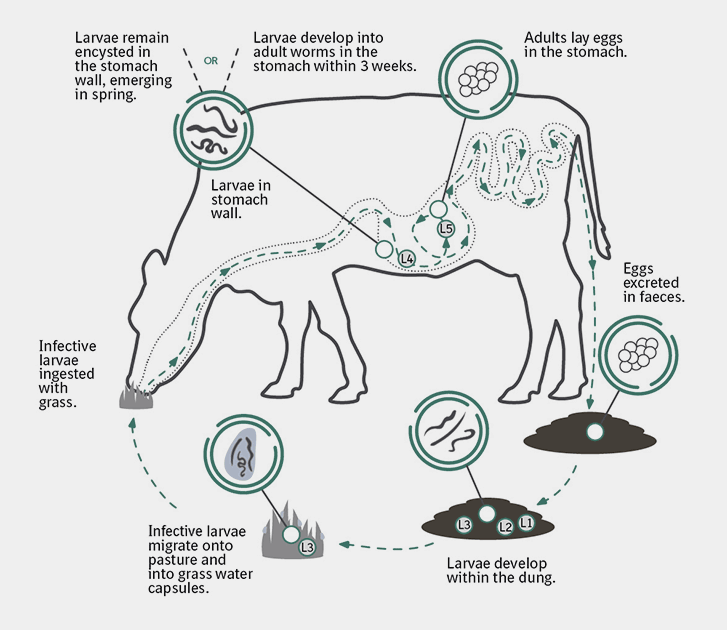A brief guide to Bison Health
Unless you have sorting pens and a bison squeeze chute, you are strongly encouraged you to buy a quality dart gun. Don't make the mistake we made and try to get a dart gun when you need it. Be proactive rather than reactive. Dart guns and the darts themselves are often backordered so keep a stock on hand. You will need a dart gun that can deliver a 10cc dose at a distance of 20-30 yards. A dart gun is not used for sedation but to deliver medication. We have had good luck with Pneu-dart.
Infectious Diseases
Bison are resistant to most diseases affecting cattle and other ruminants, so the decision to vaccinate your bison and with what is a decision you need to make.

Malignant Catarrhal Fever (MCF), carried by sheep, is deadly for bison and there is no vaccine available. Blue eyes is a characteristic sign of MCF.
There is no vaccine available for the two major deadly infectious diseases affecting bison, Malignant Catarrhal Fever (MCF) and Mycoplasma bovis. MCF is carried by sheep and you should avoid all contact between bison and sheep. M. bovis is transmitted to bison from other bison and/or cattle.
Disease has never been reported in bison for many of the common cattle diseases, including Infectious Bovine Rhinotracheitis (IBR), Parainfluenza 3 (PI-3), Bovine respiratory syncitial virus (BRSV) and E. coli scours. Although disease has not been reported, that does not necessarily mean bison do not get the disease so use your own judgment. However, because there is limited information on vaccine use in bison, staying away from modified live vaccines is recommended.
There is no consistency between herds on what vaccines are used. We generally recommend vaccination for what is commonly recommended in your area for cattle. We vaccinate with Triangle 10 (IBR, BVD Types I and II, PI3, BRSV, and 5 strains of Leptospirosis) and Covexin (7-way blackleg including red water and tetanus protection) because Leptospirosis and Blackleg can be issues in the South. Your particular area may have other issues.
Intestinal Parasites

Life cycle of Ostertagia spp., the brown stomach worm. Along with the other stomach worm, Haemonchus spp., these 2 worms can be devastating to a bison herd and I, unfortunately, can attest to that from experience.
Parasites are probably the number one killer of captive bison, particularly those confined to smaller areas. Bison do not do well with the parasites brought over from the European cattle. If you see your bison losing weight or sick, 99% of the time it is due to parasites.
The big killers in the South are the trichostronglid nematodes (round worms), Haemonchus spp. ("barber's pole worm") and Ostertagia spp. ("brown stomach worm".) But, just because you are not in the South does not mean you do not have to worry about these killers – they are a problem everywhere.
You should develop a rigorous worming program particularly if your bison have exposure, direct or indirect, to cattle. We worm in the fall during our roundup with an injectable and oral drench. When they head back out to pasture, usually April 1st, they are given a wormer in their drinking water. We worm them again in their drinking water during peak parasite burden (usually July/August). Any animal showing signs of weight loss in between those times are wormed with an injectable by dart.
Fecal egg counts (FEC) are important to monitor the parasite burden of your bison as well as determining what parasites are prevalent in your area and your animals. Knowing the parasite burden and the type of parasites present will help you determine frequency and the type of anthelmintic (wormer) to use.
That being said, be careful interpreting FEC's on individual animals. Bison are naïve hosts to most parasites and are considered by some to be an unnatural host resulting in erratic egg shedding in feces. I once lost a bison due to parasites because FEC's were negative and I believed the results. Consider FEC's on a herd basis rather than individually.
Local vets, unfamiliar with bison, do not appreciate the susceptibility of bison to internal parasites or how devastating a parasitic burden can be. Bison are not cattle! Develop an aggressive anti-parasite protocol and stick with it. Bison can lose weight and go downhill in a blink of an eye due to parasites.
If you have any questions related to the health of your bison, please do not hesitate to contact me.
Ozark Valley Bison Ranch LLC
Fox, AR
